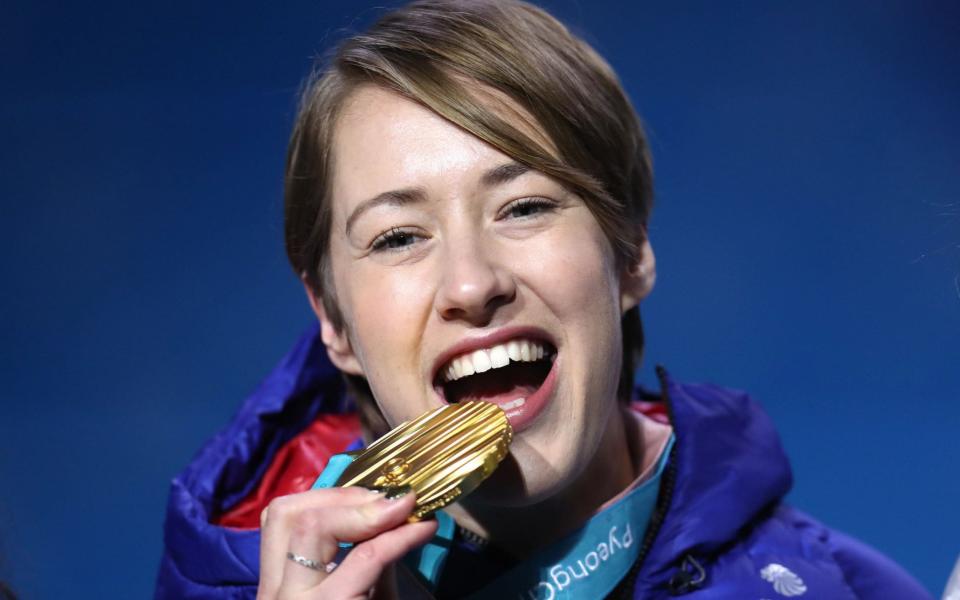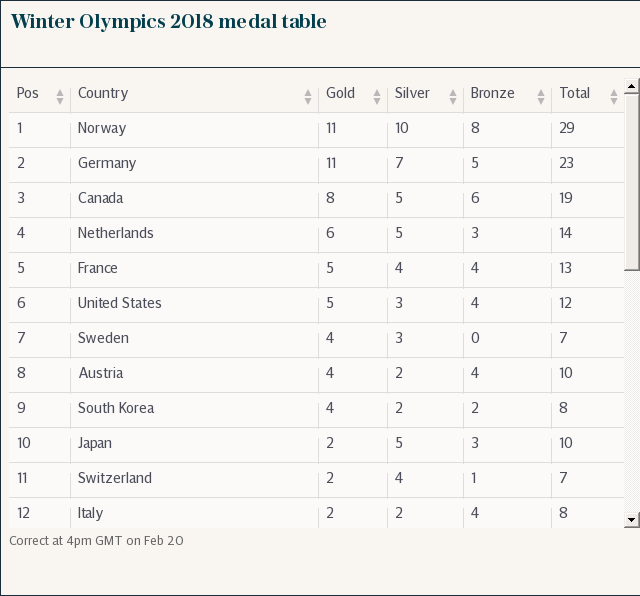Winter Olympics - Yarnold celebrates gold with Netflix and knitting

Knitting and Netflix: such was Lizzy Yarnold’s homespun recipe for happiness in the hours after winning back-to-back Winter Olympic golds. For all the delirium that engulfed her upon a stunning defence of her skeleton title, it was testament to her domesticated nature that she preferred to retreat to her hotel room, watching episodes of Miss Fisher’s Murder Mysteries, the latest Australian crime drama, while learning how to knit a few simple stripe patterns.
“My nan first taught me,” she explained. “She passed away recently, so this is my way of feeling connected to her.”
Yarnold has seldom been one of life’s natural rock ’n’ rollers. When she decided to take a sabbatical from sport in 2015, she described her priorities as making lampshades and choosing wallpaper for her house. In part, this was a reaction to the year of indulgence that followed her first gold, when she grew accustomed to receptions at 10 Downing Street and television exposure galore. This time, after bookending her triumph in Sochi with another in Pyeongchang, she claimed to have more modest aspirations when she returned home.
READ MORE: Winter Olympics - Yarnold ‘banned’ from making speech at Deas’ wedding
READ MORE: Winter Olympics - IOC aware of reported failed drugs test from Russian athlete
READ MORE: Winter Olympics - Vonn hits back at online abuse accusing her of being ‘anti-American’
“Normality is a strange thing when you have been away for four or five months. When I get to put away my wash bag, that’s a big occasion. I’m looking forward to remembering I’m a terrible cook.”
For one who had slept just three hours, having marmalised her opponents by almost half a second despite carrying a virus, Yarnold looked remarkably fresh on Sunday. Clearly, life as a newly-minted double Olympic champion, the first British athlete to win at successive Winter Games, mitigated the worst of the fatigue. Would she be tempted to chase a third, in Beijing in 2022, at the age of 33? “Let me get back to you on that,” she smiled. “It hasn’t been 24 hours yet.”

More immediately, she is planning a holiday with her best friend, the bronze medallist Laura Deas, at whose wedding in June she will be a bridesmaid. Yarnold also takes seriously the copious volume of invitations to schools that are also sure to be in the post. After Sochi, she undertook “three to four hundred” such visits, parading her medal as a means of encouraging more children to follow her lead.
In a sport as niche as skeleton, appealing to the next generation is a vexed issue. There is just one training facility in Britain, at the University of Bath, with little opportunity for young viewers inspired by the spectacle of Yarnold’s second gold to try it out. The inherent dangers of barrelling down an ice chute at 80mph also make it a far less accessible enterprise than putting on a pair of skis. In many parts of Europe, skeleton is viewed as so hazardous that under-16s are barred from participating.
And yet skeleton receives £6.5 million in Lottery funding over the four-year Olympic cycle. Few could doubt the investment has reaped reward in terms of medals, with Yarnold’s latest gold the third in a row by a British woman, but is it a case of the country snatching at low-hanging fruit? The top 10 finishers here in South Korea included two Britons, three Germans and two Canadians, indicating the sport’s lack of geographic spread.
Against this backdrop, athletes from sports such as basketball, which have had their UK Sport funding withdrawn, have lamented that they are being ignored in favour of “obscure” middle-class sports shut off to those from poorer or more ethnically diverse backgrounds. Temi Fagbenie, a player on the British women’s team, said: “When I see sports like skeleton and modern pentathlon getting millions of pounds, I wonder what sort of world the powers that be are living in, and what agenda they are trying to push.”
Yarnold, though, was quick to defend skeleton’s honour, arguing that she and her British team-mates, who won three medals in Pyeongchang, were worthy of their lavish backing. “I’m not the one making the decision on who gets money and who doesn’t,” she said.

“My job as an athlete is to perform at Olympics and world championships. I do think that we inspire people. I show videos of me hurtling down the track and people ask me, ‘How is she doing this, a schoolgirl from Kent?’”
Rival teams in South Korea have also groused that Britain’s success in skeleton owes as much to technology as to an athlete’s individual skill.
Yarnold shot down that theory in flames, too. As the wife of James Roche, a data analyst who works with Sir Ben Ainslie on preparing the country’s next America’s Cup team, she saw no shame in trying to derive maximum advantage from technology, whether on the sleds or the highly aerodynamic skinsuits.
“It’s a real British engineering story of success,” she said. “First and foremost, however, it is the skeleton athlete on the sled. There are other elements – gloves, shoes, helmets, the sleds themselves – where we have pushed the technology to find out as much as we can, like any nation would, but I would always say that the slider has the most impact.”
With a second gold around her neck, proving beyond doubt her mettle for the grandest stage, Yarnold had all the support for that view she needed.

